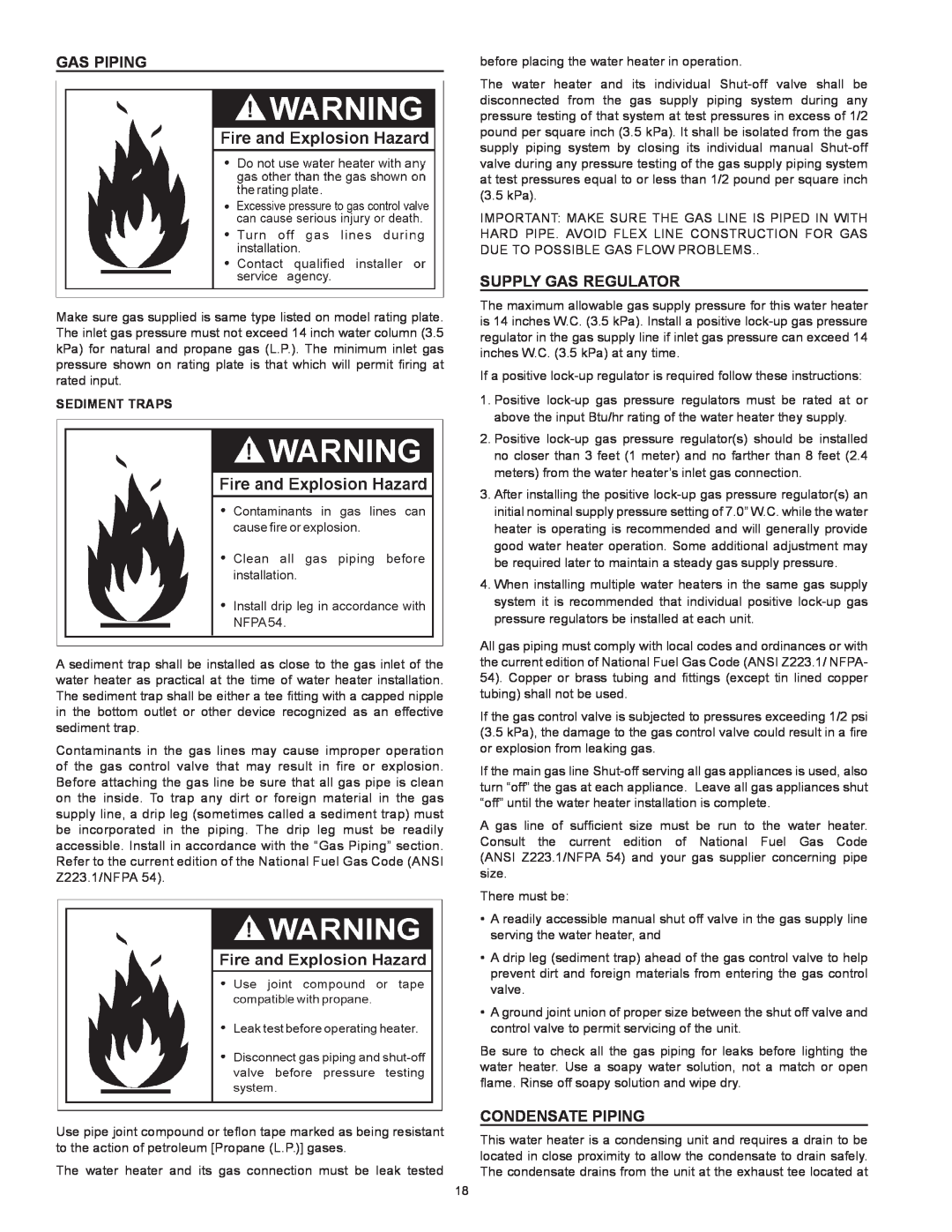
Gas Piping
Make sure gas supplied is same type listed on model rating plate. The inlet gas pressure must not exceed 14 inch water column (3.5 kPa) for natural and propane gas (L.P.). The minimum inlet gas pressure shown on rating plate is that which will permit firing at rated input.
SEDIMENT TRAPS
A sediment trap shall be installed as close to the gas inlet of the water heater as practical at the time of water heater installation. The sediment trap shall be either a tee fitting with a capped nipple in the bottom outlet or other device recognized as an effective sediment trap.
Contaminants in the gas lines may cause improper operation of the gas control valve that may result in fire or explosion. Before attaching the gas line be sure that all gas pipe is clean on the inside. To trap any dirt or foreign material in the gas supply line, a drip leg (sometimes called a sediment trap) must be incorporated in the piping. The drip leg must be readily accessible. Install in accordance with the “Gas Piping” section. Refer to the current edition of the National Fuel Gas Code (ANSI Z223.1/NFPA 54).
Use pipe joint compound or teflon tape marked as being resistant to the action of petroleum [Propane (L.P.)] gases.
The water heater and its gas connection must be leak tested
before placing the water heater in operation.
The water heater and its individual
Important: Make sure the gas line is piped in with hard pipe. Avoid flex line construction for gas due to possible gas flow problems..
Supply Gas Regulator
The maximum allowable gas supply pressure for this water heater is 14 inches W.C. (3.5 kPa). Install a positive
If a positive
1.Positive
2.Positive
3.After installing the positive
4.When installing multiple water heaters in the same gas supply system it is recommended that individual positive
All gas piping must comply with local codes and ordinances or with the current edition of National Fuel Gas Code (ANSI Z223.1/ NFPA- 54). Copper or brass tubing and fittings (except tin lined copper tubing) shall not be used.
If the gas control valve is subjected to pressures exceeding 1/2 psi (3.5 kPa), the damage to the gas control valve could result in a fire or explosion from leaking gas.
If the main gas line
A gas line of sufficient size must be run to the water heater. Consult the current edition of National Fuel Gas Code (ANSI Z223.1/NFPA 54) and your gas supplier concerning pipe size.
There must be:
•A readily accessible manual shut off valve in the gas supply line serving the water heater, and
•A drip leg (sediment trap) ahead of the gas control valve to help prevent dirt and foreign materials from entering the gas control valve.
•A ground joint union of proper size between the shut off valve and control valve to permit servicing of the unit.
Be sure to check all the gas piping for leaks before lighting the water heater. Use a soapy water solution, not a match or open flame. Rinse off soapy solution and wipe dry.
Condensate Piping
This water heater is a condensing unit and requires a drain to be located in close proximity to allow the condensate to drain safely. The condensate drains from the unit at the exhaust tee located at
18
